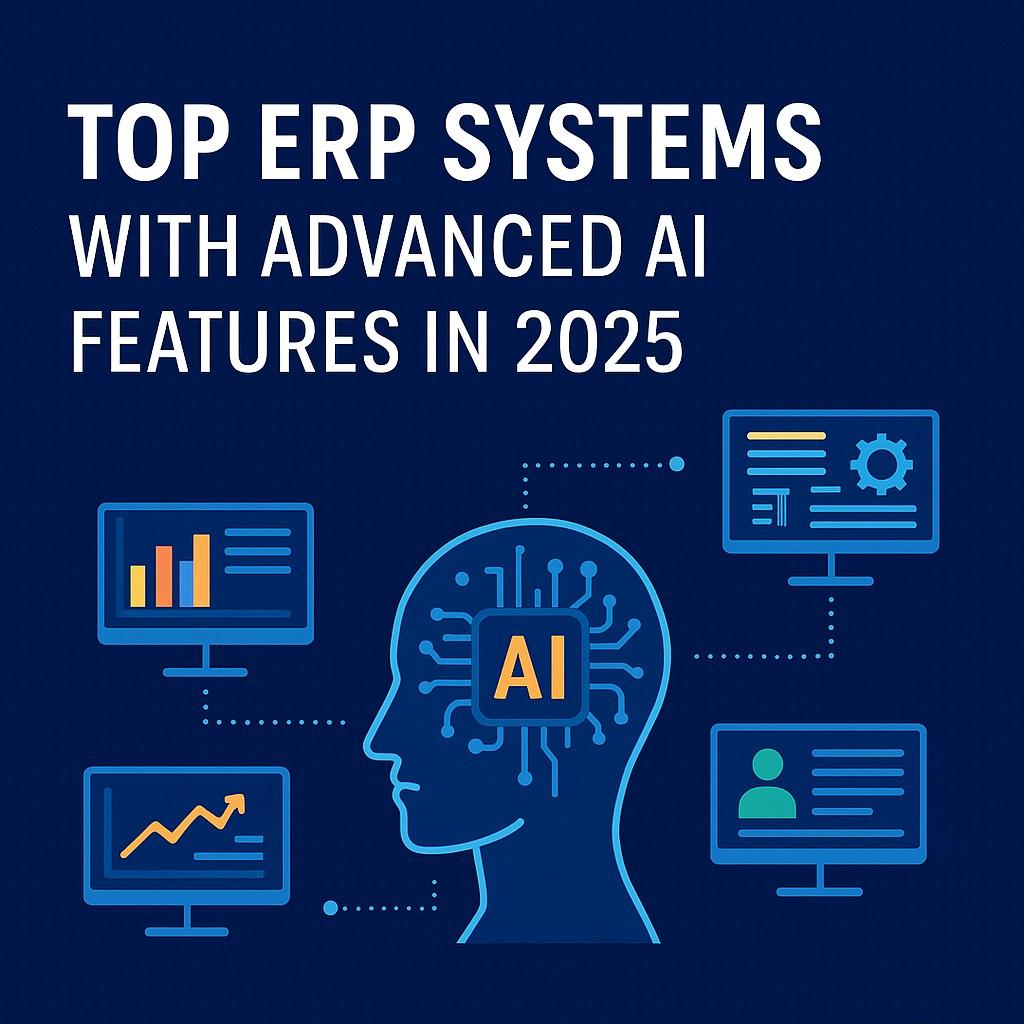Introduction
ERP software used to be the corporate version of broccoli—necessary, healthy for your business, but hardly exciting. Fast forward to 2025, and suddenly ERP systems have become the Michelin-star gourmet dish of enterprise software (yes, with AI as the secret sauce). What changed? Artificial Intelligence didn’t just sneak in quietly—it barged in with predictive analytics, automation, and insights that make CFOs feel like they have a crystal ball.
As a Custom ERP Software Development Company in USA, we’ve seen this transformation firsthand. From clients who once begged for “just basic inventory management” to those now demanding AI-driven forecasting that rivals Wall Street analysts—it’s been quite a ride. And if you’ve ever had to explain to a CEO why their ERP system still needs “manual report generation,” you’ll understand why we’re downright giddy about these AI advancements.
SAP S/4HANA – The Veteran Who Got a Brain Upgrade
SAP didn’t jTop ERP Systems with Advanced AI Features in 2025
ust dip its toes into AI; it dove headfirst. With S/4HANA’s embedded AI, machine learning models now automate invoice processing, fraud detection, and even hiring recommendations. It’s as if the ERP woke up one morning and said, “You know what? I’ll take care of the boring stuff for you.”
We recall working with a client in logistics who once had an entire team manually reconciling invoices. With AI-powered SAP, that same task now takes minutes instead of days. Their only complaint? They miss the “bonding time” over late-night Excel errors.
Oracle Fusion Cloud – Predictive Insights on Steroids
Oracle Fusion Cloud takes predictive analytics seriously (and by seriously, we mean it can tell you when your sales might tank before you even realize your marketing campaign flopped). Its AI engine churns through historical data, seasonality, and customer behavior to provide “what’s coming next” dashboards that are oddly addictive to check.
One of our retail clients joked that Oracle’s AI “knows our customers better than we do.” And honestly, they weren’t wrong—when the system predicted a holiday sales dip in advance, it gave them time to pivot with a new promo strategy. Spoiler: it worked.
Microsoft Dynamics 365 – The AI Sidekick for Everyone
Microsoft Dynamics 365 is like that friendly neighbor who always has the right tool for the job. Except now, thanks to AI Copilot integration, it’s more like having a neighbor who also happens to be a data scientist, sales strategist, and HR guru rolled into one.
From natural language queries (“Show me revenue growth in Q2 compared to last year”) to automated customer service responses, Dynamics makes AI accessible without scaring off the less tech-savvy managers. We once demoed it to a client’s finance head who swore he was “allergic to AI”—by the end of the session, he was asking if Copilot could “also do his taxes.”
NetSuite ERP – AI for the Mid-Market Mastermind
For mid-sized companies, NetSuite is the Goldilocks option: not too complex, not too simple—just right. With its AI enhancements, it offers intelligent demand planning, cash flow forecasting, and anomaly detection that can spot accounting errors faster than a seasoned auditor.
We’ve seen NetSuite save businesses from “mystery cash leaks” that might have otherwise gone unnoticed for months. It’s the kind of ERP that keeps both CFOs and auditors happy—a rare and magical balance.
Infor CloudSuite – The Industry Specialist with AI Flair
Infor has always been about industry-specific ERP, but with AI baked in, it feels more like a specialist consultant. Whether you’re in manufacturing, healthcare, or hospitality, Infor’s AI models are tuned to your sector’s quirks.
For example, one healthcare client of ours benefited from AI-driven patient flow optimization—something their previous ERP couldn’t even dream of. The outcome? Reduced wait times, happier patients, and staff who no longer felt like they were starring in a hospital drama series.
Custom-Built ERP Systems – When Off-the-Shelf Just Won’t Cut It
Of course, no list would be complete without acknowledging the growing demand for custom ERP software development. Off-the-shelf solutions are great until you hit the “our business is unique” wall. That’s where we, as a Custom ERP Software A, step in—building AI-powered ERP platforms tailored precisely to your workflows, compliance needs, and growth strategies.
We once had a client in e-commerce who tried three different ERPs before realizing none could handle their multi-channel complexity. A custom-built AI-driven ERP turned out to be the only real solution—and it scaled with them effortlessly.
The Bigger Picture – Why AI in ERP Isn’t Optional Anymore
Here’s the reality: in 2025, running an ERP system without AI is like running a marathon in flip-flops—you can try, but why would you? AI isn’t just a feature anymore; it’s the foundation for agility, resilience, and competitiveness. From supply chain predictions to HR analytics to financial forecasting, AI turns ERP into the brain of the enterprise.
And if you’re still waiting to “see where this AI thing goes,” trust us—you’ll be playing catch-up with competitors who already let their ERP handle half the heavy lifting.
Conclusion
ERP systems have come a long way from clunky, monolithic platforms that everyone loved to hate. In 2025, the winners are those who embrace AI—not as an optional add-on, but as the heart of their enterprise strategy. Whether you’re leaning toward SAP, Oracle, Dynamics, NetSuite, Infor, or a custom-built solution, the real takeaway is simple: AI isn’t the future of ERP—it’s the present.
FAQs
Q1: Why should businesses prioritize ERP systems with AI in 2025?
Because AI-powered ERP reduces manual effort, improves forecasting, and enhances decision-making. It’s the difference between reacting to problems and preventing them.
Q2: Which industries benefit the most from AI-driven ERP?
Virtually all industries benefit, but manufacturing, retail, healthcare, and logistics see the most dramatic gains. AI adapts to their complex, data-heavy processes with ease.
Q3: Are custom ERP solutions better than off-the-shelf ones?
It depends on your business. If your workflows are highly specialized, a custom ERP from a trusted development company (like us) will always outshine a generic solution.
Q4: Is AI in ERP expensive to implement?
Initial investments can be higher, but the ROI comes through efficiency gains, reduced errors, and improved scalability—making it cost-effective in the long run.



